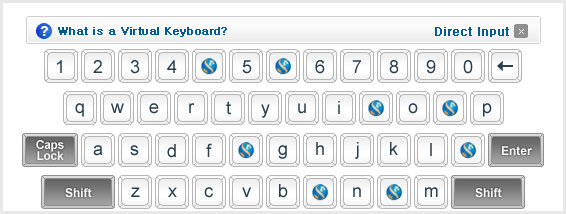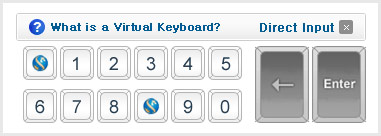정보보안정책
Security
We are continually keeping your banking and financial information safe and secure with various technical and security measures that enhance your online banking experience. Please review each of essential contents outlining security features Shinhan Bank Canada takes to protect your valuable information and assets and what you need to know about precautions to online threats. If you have any questions, please contact our representative at 416-250-3500.
Security Features
Shinhan Bank Canada implements various technical and security measures designed to protect your information and assets in online banking.
128-bit SSL certificate applied Shinhan Bank Canada’s Online Banking transmits data us
At Shinhan Bank Canada, we are committed to making your banking with us a safe and wonderful experience. We provide you with the Virtual keyboard to protect your password. The Virtual Keyboard is an online application used to enter your password or other important information with the help of a mouse. (please see “How to use Virtual Keyboard” below for more information)
Virtual Keyboard
This is an additional authentication procedure used to secure valuable information of customers and protects them from ID theft and cybercrimes. These settings are customized by you and let you know that you are on the Shinhan Bank Canada Online Banking, and not an imposter site.
The Authentication Image and security questions and answers
You will be required to input a unique security code whenever you are processing transactions or changing important areas of your online banking information.
What is Security Device?
The security device is used to secure the wire transfer transactions. The security device will be provided when the customers enroll in the Online Banking Service.
List of Other Applied Security Measures
A) Automatically Logout of online banking
: System will log out automatically after 5 minutes of inactivity due to security reasons.
B) Manage Transfer Limit
: Manage Daily transfer limit.
C) PC registration
: PC Registration service available when you login. If you do not register your PC, you will be asked for one of your security questions at each login.
How to use Virtual Keyboard
Instead of using the actual keyboard, Virtual Keyboard is a program used to enter user’s password/secure information by using the mouse which keeps away from any external disclosures and guarantees security related to any financial transactions.
Virtual Keyboard’s features
A) Secure and encrypt user’s information with this service
B) Settles customer’s apprehension with secure transactions
C) Chose verified secuity technique
D) Increased customer’s convenience by offering intuitive user interface
E) No need of installing Active-x like plug-ins
Instructions of how to use virtual keyboard
A) Text Keyboard

1. Click on ‘Direct Input’ button when not using virtual keyboard
2. Select the value on virtual keyboard to type
– Backspace: When typed wrong value, deletes by letter by letter
– Caps lock: Changing letters to Capital letters
– Enter: Click after input complete
3. Capital letters ignored and typed with small letters, even if Caps Lock is on.
B) Number Keyboard

1. Click on ‘Direct Input’ button when not using virtual keyboard
2. Select the value on virtual keyboard to type
– Backspace: When typed wrong value, deletes by letter by letter
– Enter: Click after input complete
What does ‘Phishing’ mean?
The term, Phishing is a word combination of Private Data and Fishing. This is a new financial fraud in cyberspace that directs users to a fraud website by sending out emails with website links or posting such information on web boards to steal personal information.
What does Pharming mean?
Upon the creation of a fraudulent website, it will either hack into customer`s computer or inducing customers to access to the website.
- Local Hacking: Hacks into a PC and directs users to a phishing website by modifying host files.
- Domain Hijacking: directs users to a phishing website by stealing domain.
- DNS Server Hacking: Hacks into DNS server and creates fake DNS name to direct users to the site.
How to prevent Phishing and Pharming
Do not try to access to financial institute websites links in emails or web boards.
The fake website directed through the links in emails or web board looks almost identical as to the real website so it is difficult to recognize if it is the real website. The source of phishing mails are delivered under the name of `XX bank` or `XX bank administrator` and offer linkage to other fraudulent websites. Commonly, email or post tempting false messages on a web board to bring up instant responses of victims and induce them to enter their information.
Please access your financial institution`s website via the `Favorites` link or through the search engine.
Do not enter personal information in a financial institution website accessed through suspicious website or postings.
Please double check (confirm) emails without specifying sender`s name, contact information and purpose of collecting personal information.
Emails without specifying sender`s name, contact information and purpose of collecting personal information are sent out to random people.
Prior to access, please check to see if the financial institute`s website is valid.
The domain names of legal financial institutes are composed of the company name (initial or special words) and ends with .com or co.kr ( Eg. Xx Bank: www.xxxx. Com, xx bank: www.xxx.co.kr). Valid websites usually appear only after the installation of encrypted programs along with a virus check.
If your personal and financial information is requested through email, please report to the relevant financial institution or government authority or police.
Please report to the relevant financial institution or government authority or police, if your SSN, account number, password or credit card information are requested in an email sent by a financial institute or a website.
Please install security softwares such as anti-virus softwares and periodically update them.
Most of hacking software can be found and removed by anti-virus software. Please download the latest version of anti-virus software.
